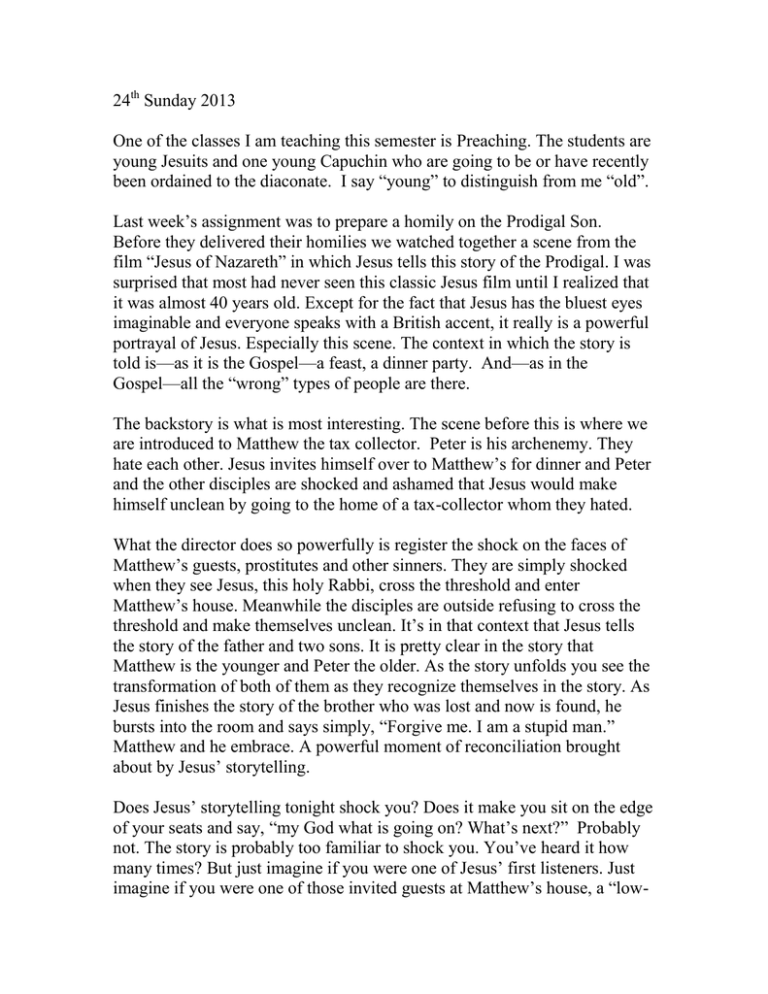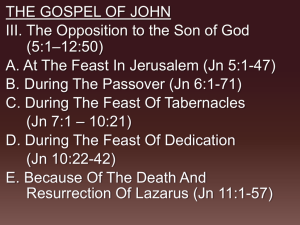24 Sunday 2013
advertisement

24th Sunday 2013 One of the classes I am teaching this semester is Preaching. The students are young Jesuits and one young Capuchin who are going to be or have recently been ordained to the diaconate. I say “young” to distinguish from me “old”. Last week’s assignment was to prepare a homily on the Prodigal Son. Before they delivered their homilies we watched together a scene from the film “Jesus of Nazareth” in which Jesus tells this story of the Prodigal. I was surprised that most had never seen this classic Jesus film until I realized that it was almost 40 years old. Except for the fact that Jesus has the bluest eyes imaginable and everyone speaks with a British accent, it really is a powerful portrayal of Jesus. Especially this scene. The context in which the story is told is—as it is the Gospel—a feast, a dinner party. And—as in the Gospel—all the “wrong” types of people are there. The backstory is what is most interesting. The scene before this is where we are introduced to Matthew the tax collector. Peter is his archenemy. They hate each other. Jesus invites himself over to Matthew’s for dinner and Peter and the other disciples are shocked and ashamed that Jesus would make himself unclean by going to the home of a tax-collector whom they hated. What the director does so powerfully is register the shock on the faces of Matthew’s guests, prostitutes and other sinners. They are simply shocked when they see Jesus, this holy Rabbi, cross the threshold and enter Matthew’s house. Meanwhile the disciples are outside refusing to cross the threshold and make themselves unclean. It’s in that context that Jesus tells the story of the father and two sons. It is pretty clear in the story that Matthew is the younger and Peter the older. As the story unfolds you see the transformation of both of them as they recognize themselves in the story. As Jesus finishes the story of the brother who was lost and now is found, he bursts into the room and says simply, “Forgive me. I am a stupid man.” Matthew and he embrace. A powerful moment of reconciliation brought about by Jesus’ storytelling. Does Jesus’ storytelling tonight shock you? Does it make you sit on the edge of your seats and say, “my God what is going on? What’s next?” Probably not. The story is probably too familiar to shock you. You’ve heard it how many times? But just imagine if you were one of Jesus’ first listeners. Just imagine if you were one of those invited guests at Matthew’s house, a “low- life” rejected by religious society. Wouldn’t you be shocked to see Jesus “partying” with you? Yes, partying, celebrating. feasting with you. And then telling this story about a feast prepared for a son who had betrayed his father’s love. This father simply wants to celebrate his son’s homecoming. There are no questions asked. No explanations needed. There is reason to celebrate. His son was dead and is alive again. He was lost and is found. Feasting is the thread that holds the story together. The context is a feast, a sharing of food and drink with undesirables. The three stories that Jesus tells about finding what was lost have feasting as a way of celebration. Feasting which always means a superabundance of food, drink, friendship around the table. (Think Kool and the Gang: “Celebrate good times, Come on!”) There is much celebrating when a sinner is reconciled, when people come home where they belong, when what was lost is found. We know that life is not always about feasting. Sometimes we need to remove the e and feast becomes fast/fast. Last week Pope Francis asked the world to fast and pray for an end to violence in Syria. Fasting is a way of reminding us how much in need we are of God’s mercy and spiritual nourishment. I would love to think that Francis’ plea for fasting did bring about the possibility of a peaceful resolution to the crisis. Sometimes our fasting is for good. Sometimes our fasting comes from not such a good place in ourselves. Like the older brother. He refuses to feast with his father and brother and would rather fast from forgiveness and reconciliation. He would rather feed on resentment and anger than join in the feast. Just as the younger brother experiences famine when he is away from his father’s love and care, the older brother starves himself, refusing the agape of love and reconciliation that can be his, if he wants it. If any of you listening are feeding on resentment, anger, bitterness, is tonight Gospel an invitation to come to the feast of love and reconciliation? That’s what the Eucharist is. God’s love feast with Christ as food and drink for us who are sometimes starving and sometimes filled. Here we no do not fast but feast. (Although sometimes I wonder when I see people leaving right after communion if they think that Eucharist is fast- food rather than feast food.) Feasting means you join in the festivities and receive the gifts that are yours. So, for today at least, come to the feast of heaven and earth, come to the table of plenty.









